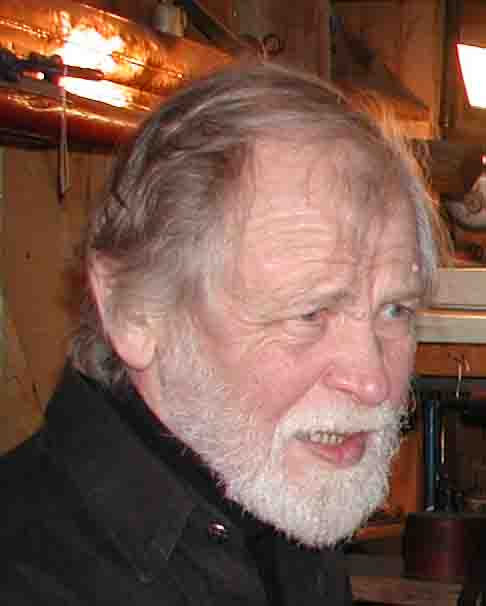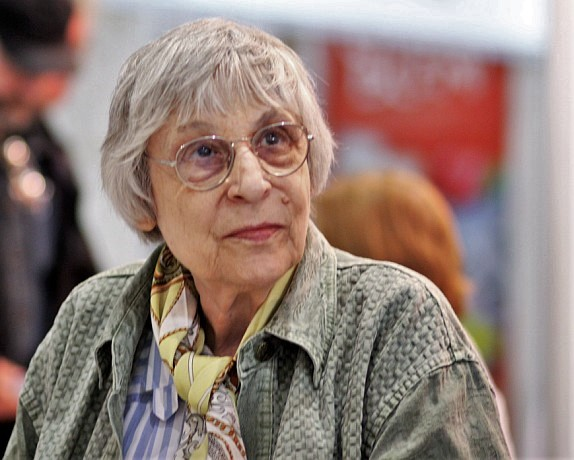Title of the work
Studio / Production Company
Country of the First Edition
Country/countries of popularity
Original Language
First Edition Date
First Edition Details
Рождение Геракла [The Birth of Heracles (Rozhdenie Gerakla)], directed by Yulian Kalisher, screenwriter K. Kedrov, poems by Yunna Morits, music by Nikolai Karetnikov, Moscow: Soyuztelefilm, 1982.
Running time
Genre
Animated films
Myths
Short films
Stop-motion animation films
Target Audience
Children (0+)
Cover

We are still trying to obtain permission for posting the original cover.
Author of the Entry:
Hanna Paulouskaya, University of Warsaw, hannapa@al.uw.edu.pl
Peer-reviewer of the Entry:
Elżbieta Olechowska, University of Warsaw, elzbieta.olechowska@gmail.com
Susan Deacy, University of Roehampton, s.deacy@roehampton.ac.uk

Yulian Kalisher in 2006. Retrieved from Wikipedia, licensed under the Creative Commons Attribution-ShareAlike 3.0 Unported (accessed: December 8, 2021).
Yulian Kalisher
, 1935 - 2007
(Director, Illustrator)
Yulian Kalisher was a Soviet director of animated movies. He started at puppet theatre as director, working in Tashkent and Moscow. From 1971 to 1995 he worked at the TV association Ekran at Multtelefilm studio. He is famous for the cartoon Большой секрет для маленькой компании [A Big Secret for a Small Company] produced jointly with Yunna Morits.
Bio prepared by Hanna Paulouskaya, University of Warsaw, hannapa@al.uw.edu.pl

Nikolai Karetnikov
, 1930 - 1994
(Composer)
Nikolai Karetnikov was a Russian and Soviet avant-gard composer. He was influenced by the Second Viennese School. He is most famous for composing operas Tijl Uilenspiegel and Mystery of St. Paul. His unique musical style and independence were criticized by the Soviet authorities, because of that he worked more for TV and cinema.
Bio prepared by Hanna Paulouskaya, University of Warsaw, hannapa@al.uw.edu.pl

Yunna Morits by Dmitry Rozhkov, 2010. Retrieved from Wikipedia Commons, licensed under the Creative Commons Attribution-ShareAlike 3.0 Unported (accessed: December 8, 2021).
Yunna Morits
, b. 1937
(Author)
Yunna Morits is a Russian and Soviet poet and translator, also a children’s poet. She often wrote politically engaged poetry and is still acting as a human rights advocate. Her books were banned from publication from 1961 to 1970.
She has been awarded many Russian and international prizes, including Andrei Sakharov Prize for Writer’s Civic Courage. Her poems are translated into many languages including Japanese and Chinese.
Bio prepared by Hanna Paulouskaya, University of Warsaw, hannapa@al.uw.edu.pl
Summary
This is a stop-motion animation, it starts with the depiction of stars and constellations and a poem about the greatness of ancient Greeks who had exceptional astronomical knowledge. Story of Heracles is shown as a fable about stars.
The movie centers on the conflict between Hera and Alcmene. Hera as a ruthless and almighty goddess wants to start a war between humans and gods. For this purpose she sends monsters to Earth (Hydra, Cerberus, the Nemean lion). At that time Alcmene gives birth to Heracles who is destined to be a protector of people. Hera steals baby-Heracles and takes him to the stars to make him a “cruel, mighty” god. Hera and Alcmene fight for the boy. With help of the Centaur Chiron, Alcmene wins, and Heracles is brought again to Earth. He defeats the snakes and grows into adulthood.
The movie finishes with a poem in honour of Ancient Greeks and humans in the style of a Sophoclean hymn to the greatness of man.
Analysis
This movie was planned to be the first part of the series about Heracles, however only one episode has been produced. The film displays a kind, magic atmosphere with serene music and pleasant poetry, sometimes melodies and verses transform into lullabies.
On the one hand, the interpretation of the myth seems to be rational, providing a scientific basis to the origin of myths. On the other, it creates myths and fables of its own. The main message of the film is the greatness of man who has the power to vanquish the most dangerous evils.
Further Reading
Karetnikov, Nikolai [Каретников, Николай], Темы с вариациями: Рассказы [Themes with Variations: Stories (Temy s variatsiiami)], Moskva: Astrel, 2011.
Kokurina, Tat’iana [Кокурина, Татьяна], Kaк все начиналось [How It All Began (Kak vsё nachinalos')], 2006, available online at hecucenter.ru (accessed August 17, 2018).
Paulouskaya, Hanna, "Steht Herakles für den Westen? Oder: die griechisch-römische Antike im sowjetischen Animationsfilm" in Markus Janka und Michael Stierstorfer, hgg., Verjüngte Antike. Griechisch-römische Mythologie und Historie in zeitgenössischen Kinder- und Jugendmedien, Heidelberg: Universitätsverlag Winter, 2017, 287–312.
Profile at kinopoisk.ru (accessed: August 17, 2018).
Selitskiĭ, Aleksandr [Селицкий, Александр], Николай Каретников: Выбор судьбы [Nikolai Karetnikov: Choice of Destiny (Nikolaĭ Karetnikov. Vybor sud'by)], Moskva: Izdatel’stvo "Kompozitor", 2011.
Viazova, Ekaterina [Вязова, Екатерина], "Юлиан Калишер" [Yulian Kalisher], in Наши мультфильмы: Лица, кадры, эскизы, герои, воспоминания, интервью, статьи [Our Animations: Persons, Scenes, Sketches, Heroes, Memories, Interviews, Articles (Nashi multfilmy: Litsa, kadry, eskizy, geroi, vospominaniia, interv'iu, stat'i)], Moskva: Interros, 2016, 212–215.
Addenda
The Remaining Production Credits:
Art direction by Liudmila Tanasenko (1944– );
Sound director Vitaly Azarovsky;
Actors Lia Akhedzhakova (1938– ), Valentin Gaft (1935–2020), Klara Rumianova (1929–2004).


